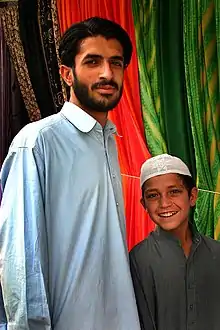پسر
Persian

یک پدر و پسرش
A father and his son
Etymology
From Middle Persian [Book Pahlavi needed] (BREl) / [Book Pahlavi needed] (pwsl /pusar/, “son”), formed from 𐭡𐭥𐭤 (pus [BRE], “son”) on the model of kinship term pairs such as [Book Pahlavi needed] (AH), [script needed] (blʾtl' /brādar/). The Middle Persian is in turn from Old Persian 𐎱𐎢𐏂 (p-u-ç /puça/).
Pronunciation
- (Classical Persian) IPA(key): /pusaɾ/, /pasaɾ/
- (Dari Persian) IPA(key): /pʊsaɾ/, /pasaɾ/
- (Iranian Persian) IPA(key): /pesæɾ/
- (Tehrani) IPA(key): /posæɾ/
- (Tajik) IPA(key): /pisaɾ/
- (dialectal, Isfahani) IPA(key): /peˈseɾ/
Audio (file)
Noun
| Dari | پسر |
|---|---|
| Iranian Persian | |
| Tajik | писар (pisar) |
پسر • (pesar) (plural پسران (pesarân) or پسرها (pesar-hâ))
Derived terms
- آقاپسر (âğa-pesar, “young man”)
- دوستپسر (dust-pesar, “boyfriend”)
- پسرانه (pesarâne, “for boys, boyish”)
- پسرباره (pesar-bâre, “pederast”)
- پسرباز (pesar-bâz, “pederast”)
- پسربچّه (pesar-bačče, “kid, baby boy”)
- پسرخاله (pesar-xâle, “cousin”)
- پسرخوانده (pesar-xânde, “stepson”)
- پسردایی (pesar-dâyi, “cousin”)
- پسرعمه (pesar-amme, “cousin”)
- پسرعمو (pesar-amu, “cousin”)
- پسرک (pesarak, “kid”)
- گلپسر (gol-pesar, “a good boy, a nice fellow”)
Further reading
- MacKenzie, D. N. (1971), “pusar”, in A concise Pahlavi dictionary, London, New York, Toronto: Oxford University Press
Urdu
Pronunciation
- (Standard Urdu) IPA(key): /pɪ.səɾ/
- (Deccani) IPA(key): /pɪ.səɾ/
This article is issued from Wiktionary. The text is licensed under Creative Commons - Attribution - Sharealike. Additional terms may apply for the media files.